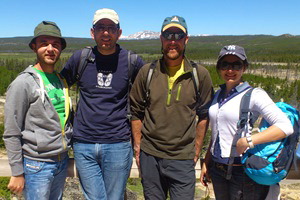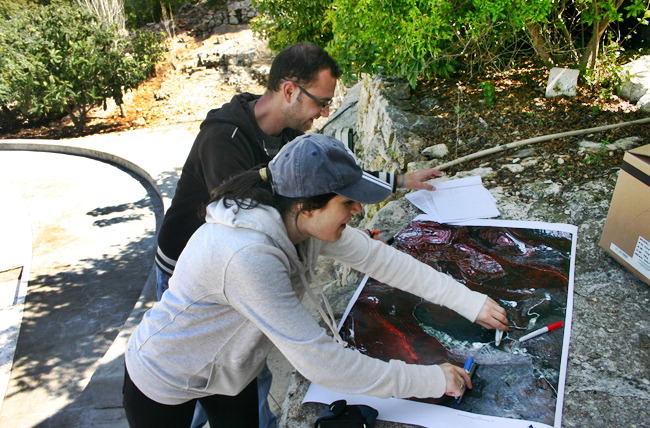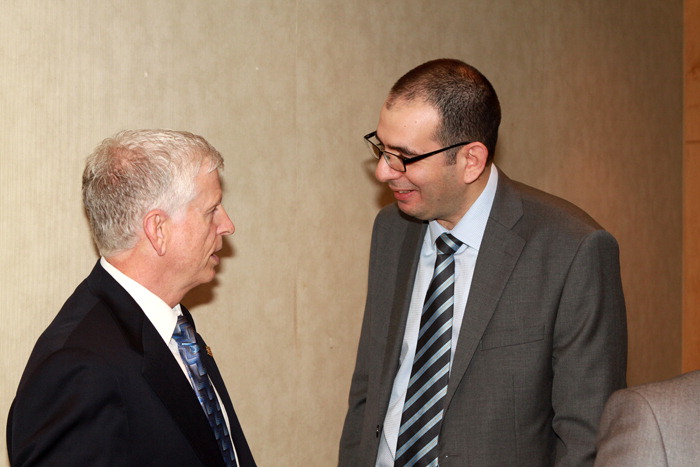|
Cycle 1 (2011 Deadline)
Towards a better assessment and management of wildfire risk in the wildland-urban interface in Lebanon: gaining from US experience PI: George Mitri, University of Balamand U.S. Partner: David B. McWethy, Montana State University
Project Dates: August 2012 - August 2016 Project Overview 
Edward Antoun, George Mitri, Dave McWethy, and Mireille Jazi during a field survey in the United States (Photo courtesy George Mitri). | Increasingly, Lebanon’s forests are exposed to degradation due to urbanization, fires, climate change, human neglect, improper management, outdated laws, and poor law enforcement. During the last decades, changes in traditional land-use and lifestyles, depopulation of rural areas, decreases in grazing pressure and wood gathering, and increases in the urbanization of rural areas are leading to the recovery of vegetation and an increase in accumulated fuel. Land-use changes are occurring in parallel with increases in fires, which have gone from being few in number and affecting small areas to becoming numerous and affecting large areas yearly. This project looked to develop the capacity of stakeholders in Lebanon to assess and manage wildfire risk in Lebanon’s wildland-urban interface (WUI) in light of future climate change and human development in wildland areas. Another goal of the project was to improve knowledge and understanding among university students, local community groups, and municipalities about the nature and risks of wildfire in Lebanon’s WUI. Specific project activities included investigating the feasibility of developing a wildfire-climate model for Lebanon that simulates the interactions among climate change, expansion of human development into wildland areas, and wildfire risk. The researchers identified data needs and partnerships necessary for future development of a wildfire-climate model for Lebanon and then developed materials that would demonstrate how such a model can be used by Lebanese stakeholders to adaptively manage wildfire risk in the WUI for future climate and land use changes. They also developed the capacity of the community of interest (i.e., land and wildland fire management agencies, homeowners, and community and regional planners) to assess and manage wildfire risk and incorporate their research results into educational products to increase understanding of wildfire risk by the broader community.
Final Summary of Project Activities
Key dissemination activities included two workshops with nearly one hundred participants from academia and government ministries, who were exposed to wildfire risk management fundamentals. The project team also created a project website and an online wildfire monitoring and data collection platform, and they authored five publications pertaining to wildfire risk management. The results of this project led directly to the following four initiatives: - An agreement was signed between in 2012-2013 between the Institute of the Environment, University of Balamand (IOE-UOB) and Lebanon Reforestation Initiative (LRI) to mainly design a pilot Firewise program for Lebanon in addition to other associated activities.
- In 2014, another agreement was signed between IOE-UOB and LRI to implement a pilot Firewise program in the village of Kaftoun in North Lebanon.
- A project was conducted with the support of UNDP-Lebanon to develop the chapter on emissions/removals from the Land Use, Land Use Change, and Forestry (LULUCF) and mitigation analysis for the Third National Communication to UNFCCC.
- A new project entitled “Assisting Reforestation and forest Development Activities in partnership with local Communities (ARDAC)” funded by the EU through the Ministry of Agriculture of Lebanon has started in 2014.
In early 2016 the team was awarded PEER Evidence-to-Action supplemental funding. The supplemental project objective was to increase fire danger preparedness in vulnerable areas in Lebanon by enhancing the Fire Lab tool capacity through design and implementation of the advanced fire danger index, to be used in combination with the forecasted fire weather index. Dr. Mitri and team conducted an inventory of fire danger warning data and produced daily reports. 
Edward Antoun and Mireille Jazi during a field survey in North Lebanon (Photo courtesy George Mitri).
| 
Discussion with Thomas Tidwell, Chief of the U.S. Forest Service (Photo courtesy George Mitri) |
| 





